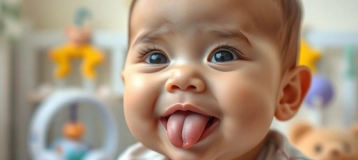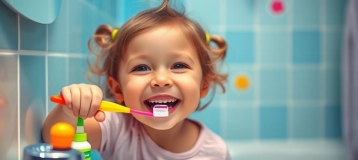Welcoming a new baby into the family is an exciting time, filled with milestones big and small. One area that's often overlooked is your baby's oral health, specifically the care of their gums. Though it may seem early, establishing a good oral hygiene routine from day one is crucial for a lifetime of healthy teeth and gums. This guide will walk you through the essential steps to keep your baby's gums healthy and happy, from birth through their first dental visit.
1. Start Early: cleaning Gums from Birth
Even without teeth, your baby's mouth is a breeding ground for bacteria. Both breast milk and formula contain natural sugars that can lead to bacterial buildup. To prevent this, gently wipe your baby's gums and the inside of their cheeks with a soft, clean, damp cloth after each feeding. This simple practice not only removes bacteria but also helps your baby get used to the sensation of having their mouth cleaned, making the transition to brushing much easier later on.
2. Navigating the Teething Phase
Teething is a major milestone, typically beginning around six months. You'll know it's coming when you see red, swollen gums and a fussy baby. It's important to continue your gum-cleaning routine during this time, but you might need to adjust your approach. A chilled teething ring can help numb tender gums before cleaning. You can also use a chilled, wet cloth to gently massage the gums, which can provide soothing relief from teething pain.
3. Brushing: The Next Step
The moment that first tiny tooth appears, it's time to introduce a toothbrush. Choose a baby toothbrush with a small head and soft bristles, and a toothpaste formulated for babies with an age-appropriate amount of fluoride. You only need a smear of toothpaste, no bigger than a grain of rice. Gently brush their new teeth and gums twice a day to keep them clean and healthy.
4. Preventing baby bottle tooth decay
Baby bottle tooth decay is a serious issue that can impact both baby and permanent teeth. It occurs when a baby's teeth are exposed to sugary liquids (other than water) for extended periods, such as when they fall asleep with a bottle of milk or juice. To prevent this, ensure your baby finishes their bottle or breastfeeding before falling asleep, and never put them to bed with a bottle of anything but water. Encourage the use of a pacifier for soothing instead of a bottle or dipping pacifiers in sweet substances.
5. Limiting Sugary Foods
Just as with adults, sugary foods and drinks can lead to bacteria buildup, plaque, and eventually tooth decay. While it's tempting to give your baby sweet treats, try to save them for special occasions. Opt for healthier, naturally sweet alternatives like mashed sweet potatoes or carrots. These options satisfy a baby's craving for sweetness without the high sugar content that can harm their developing oral health.
6. The First Dental Visit
Your baby's first dental visit should happen when their first tooth erupts, or no later than their first birthday. This visit is more about a check-up and guidance than treatment. The dentist will examine their mouth to ensure everything is developing correctly and will provide you with personalized advice on your baby's oral care. This early introduction to the dentist helps establish a positive relationship with dental care for years to come.
Healthy gums are the foundation of a healthy mouth. By starting an oral care routine early, you're not just preventing problems today; you're setting your child up for a lifetime of healthy, happy smiles.
Pro Tip
The content of the article is shared by netizens, please carefully identify it





